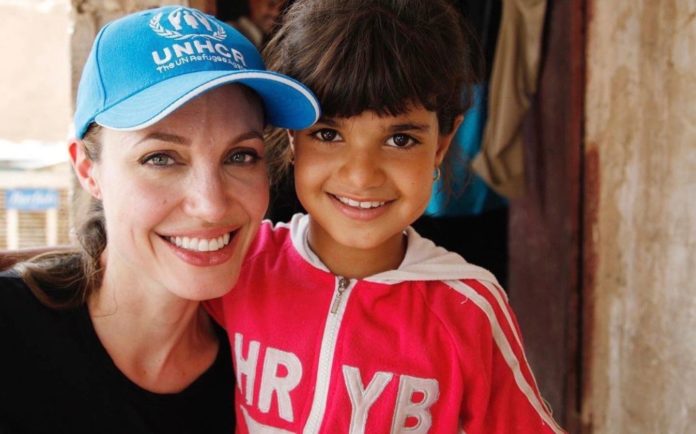
Source: Angelina Jolie/Instagram
Award-winning actress Angelina Jolie announced on Friday that she is stepping down from her role as an ambassador for the UN Refugee Agency UNHCR after more than 20 years.
“After over 20 years, I am stepping down today from my work with the UN Refugee Agency,” the 47-year-old actress told her 14 million Instagram followers.
“I believe in many things the UN does, particularly the lives it saves through emergency relief,” she added.
“UNHCR is full of amazing people making a difference to people’s lives every day. Refugees are the people I admire most in the world and I am dedicated to working with them for the rest of my life.”
According to the Hollywood star, she will now work directly with organizations directly affected by conflict.
“I will be working now with organizations led by people most directly affected by conflict, that give the greatest voice to them,” she continued.
Ms. Jolie has been working with UNHCR since 2001, and she was named Special Envoy in 2012.
“Angelina Jolie has been an important humanitarian partner of UNHCR for very long. We are grateful for her decades of service, her commitment, and the difference she has made for refugees and people forced to flee. After a long and successful time with UNHCR, I appreciate her desire to shift her engagement and support her decision. I know the refugee cause will remain close to her heart, and I am certain she will bring the same passion and attention to a wider humanitarian portfolio. I look forward to our continued friendship,” said UN High Commissioner for Refugees, Filippo Grandi.
Angelina Jolie has made the right decision in leaving the UN refugee organization because the agency is known for its rampant corruption and power abuse.
In 2018, tens of thousands of South Sudanese refugees fled across the border to Uganda, where they were met by a massive scandal involving corruption and mismanagement of the country’s refugee program.
Both government officials and the UN’s refugee agency (UNHCR) were caught up in the controversy, which made international headlines.
“Little meaningful accountability occurred on the side of the Ugandan government,” Titeca told The New Humanitarian, summarising the findings of several years he spent researching the fallout of the case. “And though individual accountability for UNHCR officials was hard to research, the available evidence raises many questions.”
“The fraud concerns eventually led to a joint UN-government probe that uncovered 300,000 “ghost refugees” in the country. The distortion may have resulted in millions of dollars of relief supplies being diverted, though the government said there were justified explanations for the mismatch,” according to the outlet.
According to a whistleblower, who had been trained in tackling fraud and corruption in Congo, the U.N. refugee agency does not always address corruption.
“On May 31, 2016, Ntezimisi traveled to the UNHCR’s headquarters in Kampala with a report he had taken two months to compile, full of specific information about instances in which refugees were asked for money. It named the offenders, the victims and the amounts, all carefully typed. The report implicated UNHCR staff, the police, other aid organizations and government employees,” NBC reported.
“It should be noticed that the people mentioned in this current fraud report is just the tip of the iceberg,” he wrote in the document. “The problem is so massive that a poor refugee without any resources could hardly pretend to be able to uncover the whole scam network in its entirety,” Ntezimisi said.


